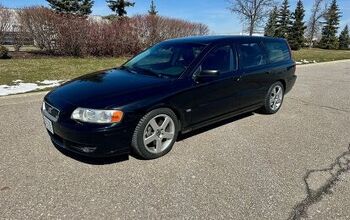Nissan Dumping Stake in Daimler

On Tuesday, Nissan Motor Co. announced that it would be selling its shares of Daimler AG. The Japanese firm owns about 1.5 percent of Germany’s oldest automaker and the move is something many were predicting after Renault did the same in March.
Nissan’s offloading will mimic its partners and likewise use an accelerated bookbuild offer that basically means dumping shares as quickly as possible with help from an underwriter. Investors were to expect shares to be priced around 69.85 euros apiece, netting the automaker at least $1.2 billion if everything goes smoothly.
As with Renault, Nissan said it would continue working with Daimler. Though it’s not clear if there are any projects in the works at present and the tie-up seemed to be running out of steam ever since Dieter Zetsche announced he would be retiring as Daimler’s CEO. His successor, Ola Källenius, made it clear that he was far more interested in building bridges with longtime rival BMW.
Back in April 2010, Daimler took a 3.1 percent share in both Renault and Nissan. In exchange, they both bought up a 1.55 percent share in the German firm. While this yielded cooperation on several small vehicles and Nissan being put in charge of building engines for Daimler in Tennessee, the partnership ran out of steam quickly. Using the Navara as the basis for the Mercedes-Benz X-Class pickup also turned out to be a mistake. Meanwhile, the Daimler-based Infiniti QX30 failed to impress customers as much as it did reviewers due to its prioritizing style over substance.
Collaborative projects have all but dried up since, with the amount of industrial overlap between Renault/Nissan and Daimler declining every year since 2017. The German company has been looking at opportunities in China in the interim and has announced numerous deals with Geely — which now owns a 9.7 percent stake in Daimler.
[Image: Pixfly/Shutterstock]

A staunch consumer advocate tracking industry trends and regulation. Before joining TTAC, Matt spent a decade working for marketing and research firms based in NYC. Clients included several of the world’s largest automakers, global tire brands, and aftermarket part suppliers. Dissatisfied with the corporate world and resentful of having to wear suits everyday, he pivoted to writing about cars. Since then, that man has become an ardent supporter of the right-to-repair movement, been interviewed on the auto industry by national radio broadcasts, driven more rental cars than anyone ever should, participated in amateur rallying events, and received the requisite minimum training as sanctioned by the SCCA. Handy with a wrench, Matt grew up surrounded by Detroit auto workers and managed to get a pizza delivery job before he was legally eligible. He later found himself driving box trucks through Manhattan, guaranteeing future sympathy for actual truckers. He continues to conduct research pertaining to the automotive sector as an independent contractor and has since moved back to his native Michigan, closer to where the cars are born. A contrarian, Matt claims to prefer understeer — stating that front and all-wheel drive vehicles cater best to his driving style.
More by Matt Posky
Latest Car Reviews
Read moreLatest Product Reviews
Read moreRecent Comments
- Kwik_Shift_Pro4X Save your money and just keep the car.
- MaintenanceCosts Good stuff. I miss my LS, although it was not as bulletproof as your GS has been, having experienced suspension issues and a premature water pump leak. Lexus knows how to do a comfy sedan.
- Dartman Nice write up. Well maintained garaged cars easily last 15+ years (
- Redapple2 The VW saga is well remembered. Ug. RE your Lexus, with such a long refuel interval I d burn only E 0. Some of your E 10 in the tank may be from 6 mo ago.
- 28-Cars-Later The CD player is glorious. Edit: Also really nice job on the initial shot. I'm not sure if you had any training in photography but it looks professional.


































Comments
Join the conversation
Another marriage of equals gone horribly wrong. One billion it not much money today. One trillion - now we are talking. Trillion is the new normal after Covid inflicted madness. And then there are things like computer chips that no amount of money can buy.
Mazda has been the darling of critics for the last decade. Unfortunately, this has not translated to robust sales for Mazda.